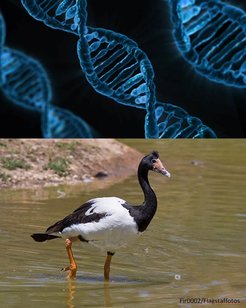The Anseriform Genome Project: Comparative Genomics of Waterfowl

The Anseriformes (= waterfowl) are a basal group of birds and diverged from Galliformes (e.g., chicken) at least 70 million years ago. Waterfowl have been studied intensively for decades and some of the most relevant aspects of evolutionary understanding have been exemplified in this group. From an evolutionary perspective, Anseriformes contain disproportionally many very old lineages. Also, they harbour the highest rates of inter-species, and often inter-genus, hybridisation across all birds. Due to their wetland habitat, which contains a diverse fauna of pathogens, waterfowl have long become a model system to study diseases, especially those that can infect humans (zoonotic diseases), such as avian influenza. Waterfowl are the natural reservoir of avian influenza virus, emerged in the late 1800s, subsequently jumped host species barriers to humans, and lead to one of the greatest pandemics in human history, the Spanish flu; as well as to several others in the course of the last and the current century. While being one of the oldest groups of birds, the Anseriformes are a relatively small bird order. About 170 species in 60 genera can be comprehensibly studied on genome-wide scales while remaining an absolutely feasible study system with today’s advancements in comparative genome research.
The bird community has formed a consortium to sequence all 10,500 bird species in the world (B10K; http://b10k.genomics.cn/). This group made huge steps forward in the initial acquisition of support from Natural History Collections (led by the Smithsonian Institution) and the largest genome sequencing centre in the world, BGI in China. Consequently, a breakthrough has been achieved by the analysis of >40 genome sequences of birds in avian phylogenomics, structural genomics, methods of whole-genome phylogenetics, trait evolution and many more. In the framework of B10K we at the MPIO lead the sub-project Anseriformes. We recently obtained funding to sequence all genomes in the genus-level phase of this bird order and here offer a PhD project to work with the upcoming data set of >50 newly sequenced Anseriform species, one species for every genus in this group. The prospective student can chose between two specific lines of research, in which more specific questions will be developed:
- Hybridisation/Speciation Genomics
- Evolutionary Genomics of the Immune System
Both projects will be carried out on genome data that will be supplied by our international B10K collaborators. It is important to realise that the prospective PhD student will not be involved in the lab work that leads to the genome sequencing, because this is outsourced. Rather, s/he will focus on the bioinformatic analysis of the data. We expect the candidate to be skilled in Linux-based remote computing, and have experience with genome-scale data analysis. Additionally, although the first steps will as usual be technical bioinformatics, the prospective PhD student is expected to be grounded in Ecology and Evolution, and follow an agenda to ignite questions on the overall biology of Anseriformes in this context.
Keywords: genomics, speciation, hybridisation, immune gene evolution, disease ecology, avian influenza
Main advisor: Robert Kraus, Inge Müller, Martin Wikelski, MPIO Radolfzell
